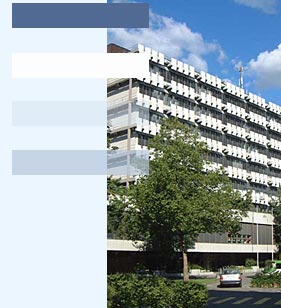 |
||
| [Basel Computational Biology Conference 2005] |

|
About us | ||||||
The Basel Computational Biology Centre [BC]2 is a collaborative effort between academic biomedical and pharmaceutical research institutes in Basel. The goal of this collaboration is to share knowledge, resources, and services in an effort to create a center of excellence in the field of computational biology and bioinformatics. It is hoped that this effort will serve as a framework to encourage collaborations and the exchange of ideas at all levels in the scientific community.
Review previous [BC]2 Meetings:
|
|||||||
|
30 years ago, at a time when biology was still considered a “soft” science and chemistry and physics were the leading “hard” sciences it was a courageous and visionary decision to create the “Biozentrum” as a center of excellence, devoted exclusively to biology. For the next 15 years the “Biozentrum” would remain the first and only such center world-wide. The success of the Biozentrum, gaining high international visibility in only a few years, attests primarily to the scientific quality of its research groups. This was helped, however, by bringing together under one roof apparently unrelated fields such as chemistry, physics, microbiology, cell biology, biochemistry, and pharmacology and to create an amalgam of these sciences with biology. During 2002, the University of Basel and the Swiss Institute of Bioinformatics (SIB) launched a collaborative effort to establish Bioinformatics as a new division at the Biozentrum to establish an internationally competitive research and teaching program in this key area of current biological sciences. Currently, the Biozentrum's Core Program Genome Scale Biology & Bioinformatics is formed by six research groups: Urs Meyer (Pharmacogenomics), Peter Philippsen (Genomics based Fungal Biology), Mihaela Zavolan (Computational Biology of RNA), Erik van Nimwegen (Genome Systems Biology), Michael Primig (Genome Annotation and Regulatory Networks), and Torsten Schwede (Protein Structure Bioinformatics).
The
Friedrich Miescher Institute is
devoted to fundamental biomedical research, employing new technologies
to explore basic molecular mechanisms of cells and organisms in
health and disease. Current research focuses on the fields of epigenetics,
growth control and neurobiology. The FMI has not only initiated
key developments in molecular biology over the years but has also
provided young scientists from all over the world with an opportunity
to participate in scientific research. This lively educational establishment
has trained hundreds of young scientists at the postgraduate and
postdoctoral levels. Many of the FMI research group leaders hold
the title of Privatdozent or Titular Professor at the University
of Basel. The FMI is part of the Novartis Research Foundation and
is also the recipient of numerous grants from national and international
agencies.
The Swiss Institute of Bioinformatics (SIB) is an academic non-profit foundation established in 1998. The SIB's mission is to promote research, teaching and service activities in the field of bioinformatics within the framework of national and international collaborations. Members of the SIB include research groups in Geneva, Lausanne and Basel. The SIB expertise is widely appreciated and its services are used worldwide by researchers in cellular and molecular biology. The SIB maintains databases of international standing (e.g. Swiss-Prot, Prosite, EPD, Swiss-2Dpage, Hits, Swiss Model Repository). It supplies and develops services for the biomedical research community worldwide by way of software and services that can be accessed from the SIB web servers (e.g. ExPASy, Melanie, T-COFFEE, PFTOOLS, Swiss-Model). It supplies services to the Swiss biomedical research community within the framework of the international network EMBnet.
|
|||||||
|
|||||||
| The Basel Computational Biology Centre has been initiated and is coordinated by Dean Flanders (FMI), Roger Jenni (Biozentrum) and Torsten Schwede (Biozentrum and Swiss Institute of Bioinformatics). |


